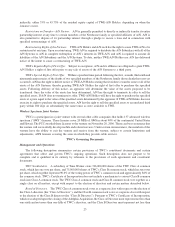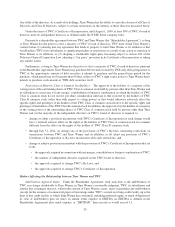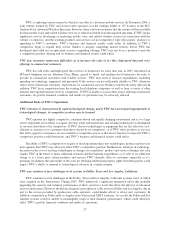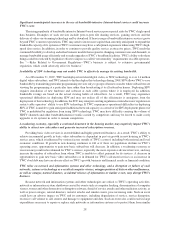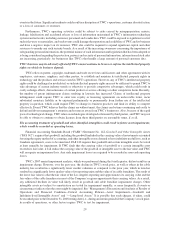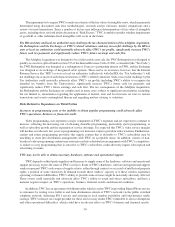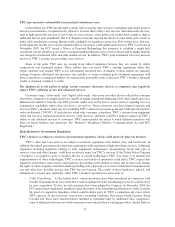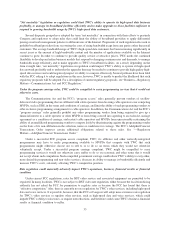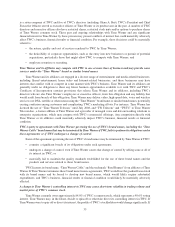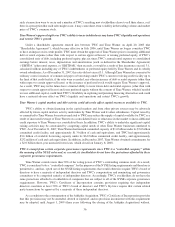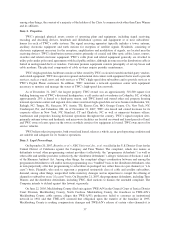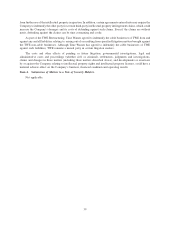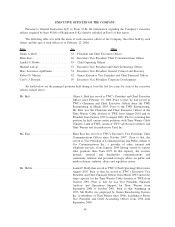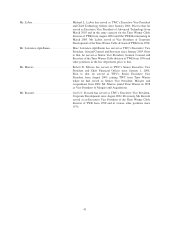Time Warner Cable 2007 Annual Report Download - page 38
Download and view the complete annual report
Please find page 38 of the 2007 Time Warner Cable annual report below. You can navigate through the pages in the report by either clicking on the pages listed below, or by using the keyword search tool below to find specific information within the annual report.“Net neutrality” legislation or regulation could limit TWC’s ability to operate its high-speed data business
profitably, to manage its broadband facilities efficiently and to make upgrades to those facilities sufficient to
respond to growing bandwidth usage by TWC’s high-speed data customers.
Several disparate groups have adopted the term “net neutrality” in connection with their efforts to persuade
Congress and regulators to adopt rules that could limit the ability of broadband providers to apply differential
pricing or network management policies to different uses of the Internet. Proponents of such regulation also seek to
prohibit broadband providers from recovering the costs of rising bandwidth usage from any parties other than retail
customers. The average bandwidth usage of TWC’s high-speed data customers has been increasing significantly in
recent years as the amount of high-bandwidth content and the number of applications available on the Internet
continue to grow. In order to continue to provide quality service at attractive prices, TWC needs the continued
flexibility to develop and refine business models that respond to changing consumer uses and demands, to manage
bandwidth usage efficiently and to make upgrades to TWC’s broadband facilities. As a result, depending on the
form it might take, “net neutrality” legislation or regulation could impact TWC’s ability to operate its high-speed
data network profitably and to undertake the upgrades that may be needed to continue to provide high quality high-
speed data services and could negatively impact its ability to compete effectively. Several petitions have been filed
with the FCC asking it to adopt regulations in this area, however, TWC is unable to predict the likelihood that such
regulatory proposals will be adopted. For a description of current regulatory proposals, see “Business—Regulatory
Matters—Communications Act and FCC Regulation.”
Under the program carriage rules, TWC could be compelled to carry programming services that it would not
otherwise carry.
The Communications Act and the FCC’s “program access” rules generally prevent vendors of satellite-
delivered video programming that are affiliated with cable operators from favoring cable operators over competing
MVPDs, such as DBS, in the terms and conditions of carriage, and limit the ability of such programming vendors to
offer exclusive programming arrangements to cable operators. In addition, the Communications Act and the FCC’s
“program carriage” rules generally prohibit any video programming vendor from being required to give up a
financial interest to a cable operator or other MVPD or from being coerced into agreeing to an exclusive carriage
agreement as a condition of carriage, and restrict cable operators and MVPDs from unreasonably restraining the
ability of an unaffiliated programming vendor to compete fairly by discriminating against the programming vendor
on the basis of its non-affiliation in the selection, terms or conditions for carriage. The FCC’s Adelphia/Comcast
Transactions Order imposes certain additional obligations related to these rules. See “—Regulatory
Matters—Adelphia/Comcast Transactions Order.”
Under a successful FCC program access complaint, TWC, its affiliates and other vertically-integrated
programmers may have to make programming available to MVPDs that compete with TWC that such
programmers might otherwise choose not to sell to or to do so on terms which they would not otherwise
voluntarily accept. Under a successful program carriage complaint, TWC might be compelled to carry
programming services it would not otherwise carry and/or to do so on economic and other terms that it would
not accept absent such compulsion. Such compelled government carriage could reduce TWC’s ability to carry other,
more desirable programming and non-video services, decrease its ability to manage its bandwidth efficiently and
increase TWC’s costs, adversely affecting TWC’s competitive position.
Rate regulation could materially adversely impact TWC’s operations, business, financial results or financial
condition.
Under current FCC regulations, rates for BST video service and associated equipment are permitted to be
regulated. In many localities, TWC is not subject to BST video rate regulation, either because the local franchising
authority has not asked the FCC for permission to regulate rates or because the FCC has found that there is
“effective competition.” Also, there is currently no rate regulation for TWC’s other services, including high-speed
data and voice services. It is possible, however, that the FCC or Congress will adopt more extensive rate regulation
for TWC’s video services or regulate other services, such as high-speed data and voice services, which could
impede TWC’s ability to raise rates, or require rate reductions, and therefore could cause TWC’s business, financial
results or financial condition to suffer.
33


